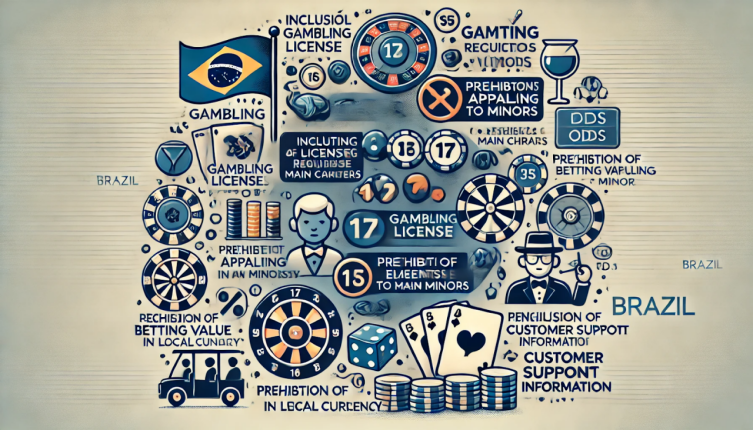
Application conditions
One of the basic requirements for applying for a Brazilian gaming license is that the applicant must be a registered legal entity in Brazil. This means that the company must be registered under Brazilian law and have a legal corporate structure established within Brazil.
In addition, the applicant's headquarters and administrative agencies must also be located in Brazil. This requirement ensures that the company has a practical operating and management base in Brazil, which facilitates supervision and management by regulatory authorities.
According to Article 7 of Law No. 14.790, the applicant's corporate structure must also have Brazilian shareholders holding at least 20% of the shares.
This regulation is intended to ensure the participation and interests of local stakeholders in the gaming business. In addition to the above conditions, applicants are also required to pay a high license fee. According to Act No. 14.790, the license fee is 30 million reais (about 43.2 million yuan) and is valid for five years.
This fee must be paid within the date of notification of the application analysis conclusion. Failure to pay the fee within the deadline will result in the termination of the authorization process.
The latest policy also stipulates that applicants must submit detailed financial statements, operating plans and security measures to ensure the legality and transparency of their operations. In addition, applicants must prove their ability to comply with Brazil's anti-money laundering and anti-terrorist financing laws and regulations.
Regulatory requirements
According to Article 7 of Law No. 14.790, the applicant for a gaming license must be a legal entity registered under Brazilian law, with its headquarters and administrative agencies located in Brazil. In addition, the applicant must have Brazilian shareholders holding at least 20% of the shares in the company structure.
According to the Normative Regulation of the Ministry of Finance No. 1.330 of October 26, 2023, applicants must also register with the official Brazilian Consumer Dispute Resolution Platform. This platform is Brazil's consumer protection platform, and companies must access it except in special circumstances.
Bill No. 14.790 also has strict regulations on advertising compliance. Advertisements must include the gambling license logo, and it is prohibited to use authorized entities to promote unauthorized entities or brands.
The main characters in the advertisements must be over 21 years old and must not attract the attention of minors. The advertising content must not be intended to attract the attention of minors, for example, it must not contain symbols, graphic resources and animations, language, personalities or characters that are considered to belong to the world of children, nor use visual, sound, language or written elements specifically targeted at minors.
Ads must include betting value and fixed odds information in Brazilian currency, plus relevant taxes. In addition, ads must include complaint and customer service contact information and set up an age confirmation pop-up window.
According to the latest policy update, applicants must also ensure that their advertising and marketing activities comply with the regulations of CONAR, the Brazilian advertising self-regulatory organization. Especially when gambling content is involved, risk warnings must be clearly marked and corresponding help information must be provided.
application process
The first step in applying for a Brazilian gaming license is to submit an application. According to Article 7 of Law No. 14.790, the applicant must be a legal entity registered under Brazilian law with its headquarters and administrative offices located in Brazil.
In addition, the company structure must have Brazilian shareholders holding at least 20% of the shares. When submitting an application, applicants need to prepare a series of documents, including company registration certificate, shareholder structure certificate, detailed financial statements, operating plans, security measures and other relevant legal documents. The documents will be submitted to Brazil’s Ministry of Finance’s Secretariat for Prizes and Gambling (SPA), the agency responsible for regulating the gambling industry.
After the application is submitted, it enters the review stage. According to the regulations of the Brazilian Ministry of Finance, the review process includes a background check of the applicant, an assessment of the financial situation, and a review of the applicant's technical capabilities.
This stage also includes an assessment of whether the applicant meets anti-money laundering and counter-terrorist financing standards. The review process usually takes several months.
During this period, applicants may be asked to provide additional information or documentation so that the review agency can fully assess their eligibility. Applicants also need to ensure that their advertising and operations comply with the regulations of CONAR, the Brazilian advertising self-regulatory organization. Once approved, the applicant will receive an approval notice and must pay the license fee within the specified time.
According to Act No. 14.790, the license fee is 30 million reais (about 43.2 million RMB) and is valid for five years. The fee must be paid within the date of notification of the application analysis conclusion. Failure to do so will result in the termination of the authorization procedure. After paying the license fee, the applicant will officially obtain a Brazilian gaming license and can legally operate gaming business in Brazil.
At this point, applicants will need to ensure that their operations continue to comply with Brazilian laws and regulations, including requirements in areas such as advertising compliance and consumer protection.
Related costs
The fees required to apply for a Brazilian gaming license mainly include registration fees and license fees.
According to Act No. 14.790, the license fee that applicants need to pay is called "authorization consideration", which is 30 million reais (about 43.2 million RMB), and the fee is renewed every five years. In addition, applicants must pay this fee within the date of notification of the application analysis conclusion. Failure to do so will result in the termination of the authorization procedure.
The fee allows applicants to use three brands in their electronic channels. According to the latest policy, applicants will also have to bear other possible administrative costs when paying the license fee.
For example, according to Normative Regulation No. 1.330 of the Ministry of Finance of October 26, 2023, applicants are required to register with Brazil's official consumer dispute resolution platform, which is one of the conditions for applying for a fixed-odds betting license.
In addition, the opening of Brazil's gaming industry is also accompanied by strict tax requirements. According to the Brazilian Ministry of Finance, the total gaming revenue is subject to a 12% tax, which may be a heavy burden for some small operators.
The latest regulations also require applicants to provide detailed tax reports to ensure that their income and expenditure are transparent and comply with Brazil's tax laws. These details further strengthen the Brazilian government's supervision of the gaming industry to ensure the legal and transparent operation of the market.










